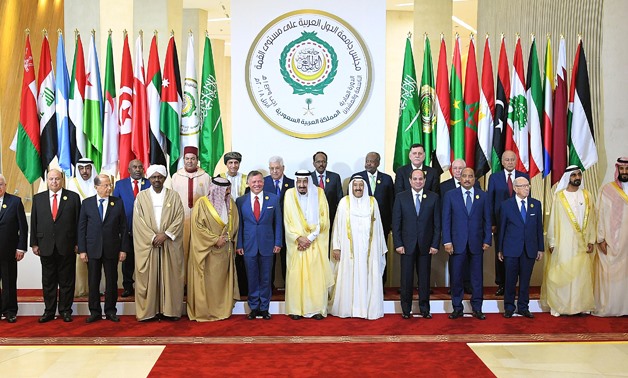
Arab leaders pose for a photo during the 29th Arab League Summit in Dhahran city, Saudi Arabia, on Sunday April 14, 2018- press photo
CAIRO – 15 April 2018: The Arab leaders, except six of them, have convened in Saudi Arabia for the 29th Arab League on Sunday, 24 hours after U.S., Britain and France launched airstrikes against Syrian sites Damascus and Homs early, but the strikes are not in their agenda.
Arab League Assistant Secretary General Ambassador Hossam Zaki revealed in press remarks before holding the opening session that the Arab summit’s agenda does not include the tripartite attacks led by the U.S. against Syria. The Gulf Cooperation Council (GCC) hailed the airstrikes in Syria, while other Arab nations expressed their concerns over the developments.
14 Leaders head their countries’ delegation
Egypt Today sheds light on the member states delegations’ representatives. Fourteen Arab leaders headed their countries’ delegation in the summit such as Egypt, Somalia, Tunisia, Palestine, Iraq, Yemen, Sudan, Mauritania, Lebanon, Bahrain, Kuwait, Jordan, the Comoros and Djibouti. Jordan’s king, the Kuwaiti emir and the Bahraini king arrived in Saudi Arabia a few hours before the summit’s opening session on Sunday.
Six countries are represented by on a non-presidential level as follows:
1. The U.A.E.’s delegation is headed by Sheikh Mohammed bin Rashid Al Maktoum, the vice president and prime minister of the United Arab Emirates, and ruler of the Emirate of Dubai.
2. Oman’s delegation is headed by Premier’s Vice President Fahd bin Mahmoud Al Saeed.
3. Libya’s delegation is chaired by Fayez Mustafa al-Sarraj, the Chairman of the Presidential Council of Libya and prime minister of the Government of National Accord of Libya that was formed as a result of the Libyan Political Agreement signed on 17 Dec.ember 17, 2015.
4. Algeria’s President Abdelaziz Bouteflika, 81, is represented by People's National Assembly Speaker Abdul-Kader bin Saleh.
5. Morocco is represented by Prince Moulay Rachid who shall represent King Mohammed VI, who underwent a heart surgery in Paris last February for an irregular heartbeat.
6. Qatar is headed by Doha's permanent representative to the Arab League, Saif bin Muqaddam al-Buainain. Qatari Emir Tamim bin Hamad Al- Thani has just returned to Doha on Saturday from a U.S. trip where he met President Donald Trump. The young emir has had tense relations with the host of the Arab League summit, as well as Egypt, UAE and Bahrain.
Earlier, Saudi Foreign Minister Adel al-Jubeir said that Qatar’s crisis would not be on the agenda at the Arab summit.
In June, Egypt, Saudi Arabia, Bahrain and the UAE boycotted Qatar for supporting extremists and funding terrorist groups. The four countries has have been reaffirming their demands on to Qatar in various occasions, which include closing Al- Jazeera satellite network and reducing ties with Iran.
Qatar’s al- Buainain arrived in Saudi Arabia on Saturday, April 14, on a commercial plane, as Saudi Arabia, along with the other three countries mentioned above, banned all direct flights with Qatar as a part of the diplomatic ties’ boycott.
Ithar hosts Arab summit for the first time
Dhahran City, located in the Eastern Province of Saudi Arabia Kingdom, hosts the summit as with 21 out of 22 member states have takingen part. Only Syria could not participate as it was suspended from the Arab League on Nov.ember 12, 2011, several months after the beginning of the uprising in Syria against the regime's oppression of its people. The Arab League reaffirmed in several occasions that the suspension is in force until Syria meets its obligations under the Arab proposal for resolving the crisis in the country.
The King Abdulaziz Center for World Culture, known as Ithra, hosts the Arab Summit’s meetings for the first time since it was established by Saudi-owned Aramco in 2016. The 45,000-meter-Ithra is located near Dammam-7 oil well, commonly known as Al-Khair Well because it was the first commercial oil well discovered in the Saudi Kingdom in 1938.
Jerusalem tops Arab Summit’s agenda
Egypt’s President Abdel Fatah al-Sisi arrived in Riyadh Saturday y, April 14, to heads his country’s delegation in the summit. In his speech, delivered during the opening session on Sunday, Sisi stressed the Egyptian rejection to breaching the Saudi sovereignty and safety; in reference to firing missiles by Houthis militias from Yemen several times recently.
Sisi tackled Syria, Palestine, Libya and Yemen issues in his speech, and called for a transparent investigation into the alleged use of such in Syria, and proposed rapid coordination between the United Nations and “only” Arab states to draft a Syrian constitution.
Jordan’s King Abdullah II, who opened the summit before handing over the presidency to Saudi Arabia, affirmed that Jerusalem is the key to peace in the region of an independent Palestinian state within the 1967 borders; based on the two-state solution and the Arab Peace Initiative.
Saudi King Salman bin Abdelaziz affirmed in his speech that the Palestinian issue is a top Arab priority and will remain so until the Palestinian people restore their legitimate rights and establish their independent state, naming the ongoing 29th Arab League Summit the 'Jerusalem Summit’.


Comments
Leave a Comment